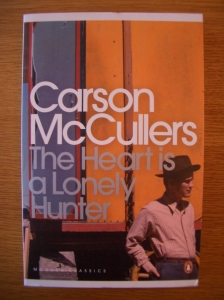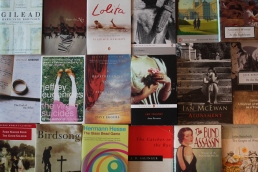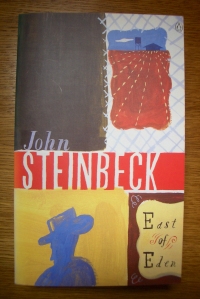I like to think that I have just about enough wit to know that a novel titled “The Heart is a Lonely Hunter” is probably not going to be awash with happiness, joy and happy endings. However, I was still slightly taken aback by just how bleak and sad this tale is.
I had not heard of Carson McCullers until I saw this novel of hers listed in the TIME Magazine 100 Best English-Language Novels Since 1923 list (see the Bookmarks page for further details). After looking it up, I thought it sounded interesting, so I asked for a copy for Christmas, and have just got round to reading it now. The novel was published in 1940 when Carson McCullers was just twenty-three years old. (Yes, 23 years old!) I tend to find such facts awe-inspiring and depressing in about equal measures. By the time I was 23 I’d written a few dull essays and the odd short story. Sigh.
The novel is set in the Deep South of America, in a small town inhabited by everyday poor folk: shop staff, mill workers, cooks and labourers. In this respect it covers similar territory to the works of William Faulkener and John Steinbeck. There are five key characters in the novel: Mick Kelly, an adolescent tom-boyish girl; Dr Benedict Copeland, a frustrated black doctor; Jake Blount, a labour agitator and a drunk; Biff Brannon, who runs the local cafe; and John Singer, a deaf-mute, to whom the others are all strangely drawn.
McCullers powerfully sketches the gap between each one of these character’s present situations, and the inner hopes and dreams that lie unrealised within them. For Mick this is an all-consuming desire to create music. In reality she does have a fine ear for music, yet her poverty prevents her from being able to pursue it as she would like. Then there is Dr Copeland, whose life passion has been to try and advance the position of his black brethren, yet who has also managed to drive his wife and children away from him. Then there is Jake, a man burning with anger at the oppressive capitalism that essentially keeps so many enslaved to poverty. Yet try as he might, he is wholly unsuccessful in helping others to see the oppression he sees and to act against it. Here is probably his most lucid outburst (ironically made to the one man he didn’t need to convince):
‘In my life I seen things that would make a man go crazy. At least one third of all Southerners live and die no better off than the lowest peasant in any European Fascist state. The average wage of a worker on a tenant farm is only seventy-three dollars per year. And mind you, that’s the average! The wages of sharecroppers run from thirty-five to ninety dollars per person. And thirty-five dollars a year means just about ten cents for a full day’s work. Everywhere there’s pellagra and hookworm and anaemia. And just plain, pure starvation. But!’ Jake rubbed his lips with the knuckles of his dirty fist. Sweat stood out on his forehead. ‘But!’ he repeated. ‘Those are only the evils you can see and touch. The other things are worse. I’m talking about the way that the truth has been hidden from the people. The things they have been told so they can’t see the truth. The poisonous lies. So they aren’t allowed to know.’
Jack, Mick, Dr Copeland and Biff all see something in shy, deaf, mute John Singer that they do not think they have ever seen in anyone else. To each of them he becomes the sole person who seems to understand, the one man who sees things as they really are. Now as the reader we see that John Singer is a good and loyal man, however we also realise that he is not the demi-god that the four characters desire him to be. The irony is, of course, that John Singer is unable to respond vocally to his friends when they are passionately unburdening their hearts to him, and as a result the John Singer that each of the four comes to love is really more a product of their own projections and longings than the real man himself.
At the beginning of the novel I thought that John Singer was going to be the unlikely Christ-like figure who would somehow save them all, but this is not the case. The Heart is a Lonely Hunter is a naturalistic work, focusing on the harsh realities of everyday life for the poor, the lonely and the outcast members of society.
If you liked this, you might also enjoy: John Steinbeck’s Of Mice and Men or William Faulkner’s Light in August.



Leave a comment